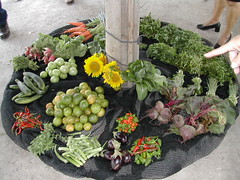My dad recently mailed me an article he ran across in a magazine, about the re-emergence of organic agriculture in Cuba. It was a tale of struggle, pain, and sacrifice, but ultimately one of triumph. I wish I could find it online to share a link with you, but I haven’t been able to find the exact article. (It was in Christian Century Magazine, September 7, 2010, Page 11, if anyone wants to dig it up. The title of the article was “Organic By Necessity.”)
 Image by hoyasmeg via FlickrHowever, there are a number of related articles, as it’s a pretty inspiring story no matter how it’s told. Below are some other articles on the topic, but here are some of the highlights from the original article.
Image by hoyasmeg via FlickrHowever, there are a number of related articles, as it’s a pretty inspiring story no matter how it’s told. Below are some other articles on the topic, but here are some of the highlights from the original article.When Cuba lost its connection with the Soviet Union in the early 90′s, the nation of conventional agriculture, readily available cheap food, and modern grocery stores (sound familiar?) lost its main source of oil-based fertilizer; and it was in for a rude awakening. Or maybe that is putting it mildly. The outcome was starvation, or close to it, for many citizens. As this article put it, “It is difficult for Americans to imagine the horrors of (this period).” Farming and gardening were not familiar past times for many of Cuba’s citizens. And not only did many people not know how to grow their own food, but those in urban areas did not have the space to do so.
But in the years since then, Cuba has become “the world’s largest working model of a semisustainable agriculture.”
Without easy access to cheap chemical fertilizers and pesticides, Cuba had to start from scratch – which meant learning to grow food the way people have grown it for thousands of years before modern civilization and the days of cheap oil. (Combined, of course, with modern research and developments which allow for the use of more advanced organic techniques and ways to utilize smaller amounts of garden space more productively.)
 Currently, in Havana, organic urban gardens (or organoponicos) have become the main food source for the city (and the same is true in neighboring cities as well). Not only that, but (and I love this statistic) farmers there make approximately three times the salary of doctors! Thus the gardens are also stimulating the local economy to a great extent.
Currently, in Havana, organic urban gardens (or organoponicos) have become the main food source for the city (and the same is true in neighboring cities as well). Not only that, but (and I love this statistic) farmers there make approximately three times the salary of doctors! Thus the gardens are also stimulating the local economy to a great extent.Although most Americans don’t often think of Cuba as progressive or role-model material, I think it is worth a careful look. Someday not too far in the future, we ourselves may have to take a page from Cuba’s book. As the article suggests, “One day soon oil will become too expensive to extract, making the price of oil too high to warrant using it for food production, and with that will come a collective cinching of American belts.”
Hopefully we won’t suffer through years of starvation as the Cubans did, but if we are to avoid that fate, we must start preparing now, and learn more about producing our own food and supporting local growers, before it’s too late.
Related Articles on Organic Agriculture in Cuba:
Havana harvest: Organic agriculture in Cuba’s capital | San …
On a recent visit we learned that Cuba has been raising its fruits and vegetables organically for more than 15 years, using worm and vegetable compost and integrated and natural pest management to raise crops for its people.
Publish Date: 02/27/2010 0:20
http://sfbayview.com/2010/havana-harvest-organic-agriculture-in-cuba%E2%80%99s-capital/
Cuba: An Urban Agriculture Utopia? « down the garden path
Cuba: An Urban Agriculture Utopia? Jump to Comments. Urban Agriculture in Havana. In 2009 I was lucky enough to participate in a three-week sustainable agriculture tour in Cuba organized through the University of British Columbia by a …
Publish Date: 09/02/2010 14:44
http://tgcgarden.wordpress.com/2010/09/02/cuba-an-urban-agriculture-utopia/
Organic Cuba without Fossil Fuels
Cuba’s experience has opened our eyes to agriculture without fossil fuels, a possibility rapidly turning into a necessity for mitigating climate change as world production of petroleum has also peaked. Dr. Mae-Wan Ho.
Publish Date: 01/23/2008 17:53
http://www.i-sis.org.uk/OrganicCubawithoutFossilFuels.php
Cuba – An Unlikely Model for Organic Farming
Going organic is typically thought of as a choice. Farms choose to become organic; retailers decide that organic is best for their customers and their business; and consumers select the products that best fit their lifestyle. In Cuba …
Publish Date: 05/12/2010 15:01
http://blog.albertsorganics.com/?p=934

No comments:
Post a Comment